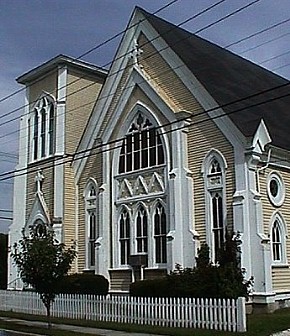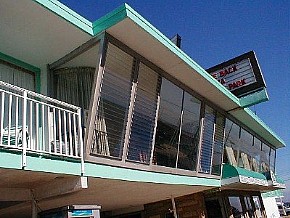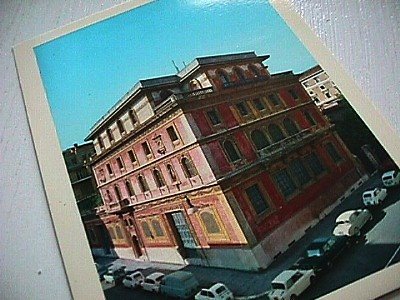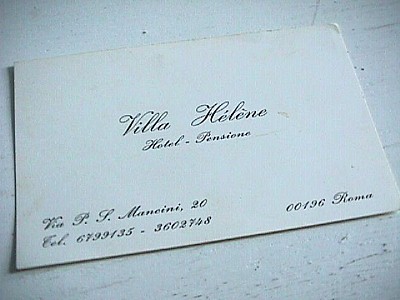2004.06.01 14:53
Re: Any idea ?
The title Cadillac Desert reminds me of the notion that Las Vegas (via Hoover Dam) is an artificial oasis, and it seems that the Southwest USA in general is operating on the artificial oasis principle--a land of oasis reenactments via abundant BTUs?
| |
2006.06.01 09:56
31 May
After lunch we took a short walk along the beach past the World War II bunker. Although the beach was replenished last year, the shoreline is much closer to the seaward face of the bunker this year (and it wasn't even high tide).
On the way back to Philadelphia we always drive through some of Cape May and Wildwood. In Cape May this building...

...is presently being converted into "unique condominiums," and in Wildwood this building...

...no longer exists.
| |
2006.06.01
Villa Hélène
The last time I was in Rome I was staying at the Villa Hélène, Via P. Stanislao Mancini, 20, near the Tiber just a few blocks outside the Popolo Gate.


AP wrote:
"all the obvious stuff...also, be sure not to miss St. John Lateran, if you're into the whole church thing...beautiful church, across the street are the Scala Santa - steps that once lead to Pontius Pilate's home in Jerusalem. History suggests that Jesus scaled these steps just before his judgement. St. Helena brought 'em back to Rome, along with other relics...you can only scale the steps on your knees, typically stopping at each for prayer..."
According to Hans A. Pohlsander, Helena: Empress and Saint (1995), p. 81:
"A short distance from the Basilica of St. John Lateran, in the Piazza San Giovanni, we find the Scala Santa, a building erected by Domenico Fontana under Pope Siztux V (1585-1590). It is a place of pilgrimage, where the faithful ascend the central stairs of the building only on her knees. The 28 marble steps of these stairs were salvaged from the original Lateran Palace. According to tradition they were brought by Helena from the palace of Pontius Pilate in Jerusalem. This tradition can be traced back no further than the 13th century."
You know, it really wasn't St. Helena that brought the steps to Rome because it was really Helena's granddaughter Helena, the youngest of Constantine and Fausta's children and the wife of (first cousin) Julian the Apostate. While Julian was busy rebuilding the Jewish Temple of Jerusalem, Helena had the Pontius Pilate palace steps shipped to Rome for safekeeping at the Domus Fausta, her mother's quondam palace at the Lateran.
| |
2007.06.01 18:24
Archinect Book Club?
Why not pick one of the free online books from 010 Publishers?
Actually, I'm more interested in finding out how global this free offer via google/books really is. Is this available to European web users? South American web users? Asian web users?
Now I really don't regret selling my copy of Metacity/Datatown on eBay. I love using the screen save command.
2008.06.01 11:07
Can you say canonical?
"In this painstaking analysis of an apparent architectural syntax, the author offers a fresh interpretation of one of the canonical works of the Brutalist movement--the Stirling and Gowan Leicester Engineering Building, completed in 1963. Responding independently to one aspect of a theme broached by Manfredo Tafuri in Oppositions 3, Eisenman attempts to uncover the precise manner in which Stirling has rewritten the "words" of modern architecture."
--Kenneth Frampton, an introduction to "Real and English: The Destruction of the Box. I." (1974).
The article was first presented in lecture form at Cooper Union in the spring of 1973 and again at Yale during the spring of 1974.
"The thrust of the argument below will be that the Leicester Engineering Building invokes a similar critical and thus, polemical, intention as Venturi, but does so in a different and perhaps less traditional manner--by distorting the form of the iconic structure as opposed to perverting the form of the iconic content, as in the case with Venturi."
"Much of the work of Louis Kahn, which proposes a classical alternative to a modern eclecticism, can surely be seen..."
"...and more recently in the wall decompositions of John Hejduk, destroys it conceptually."
"Real and English: The Destruction of the Box. I" was a (personal) inspirational motivator for a fourth year design (taken through to working drawings) project, Fall 1979. None of the faculty "got" the design--it was like Leicester Engineering meets Staatsgalerie Stuttgart. Hyper Avant. Very distorted iconic structure fucks with perverted iconic content. Then during "working drawings", Spring 1980, witnessed schizophrenic survival of horrific expressway accident, emergency room lobotomy, subsequent two-week drug-inducted coma, and the commencement of a whole new history (where all that remains canonical is a sense of humor).
| |
2008.06.01 11:14
The Official Paradigm Shift thread
"On the one side was Nature: the curves of the waves, the line of the unfolding leaf, the pattern of the crystal. All these might be studied, and in some way architecturally employed--no matter how--so long as the knowledge and the love of them were evident."
Geoffrey Scott, The Architecture of Humanism: A Study in the History of Taste, (1914), p. 68.
09060101 IQ section 8 Altes Museum ohne Saulen model 2374i04 b
14060101 collection of atypical plans 2254i04
14060102 collection of atypical plans 2309i05
14060103 collection of atypical plans 2404i09
16060101 reMS from 010106c 3392vi01
16060102 reMS from 010110b 3392vi02
16060103 reMS from 02082401 3392vi03
17060101 Tsai Karopoulos Kil Rychlicki Art Platform Sunchen
18060101 CCTV model 2332i05 b
19060101 Brant House plan site plan 221ai05
19060102 Brant House Addition plan site plan 223bi04
20060101 TJCC Day Camp plus half plans 217gi05
20060102 Acadia NPHQ Building plus half plans 2204i23
20060103 Sober House 1 plan elevation model @ iq61.11 2286i13
|